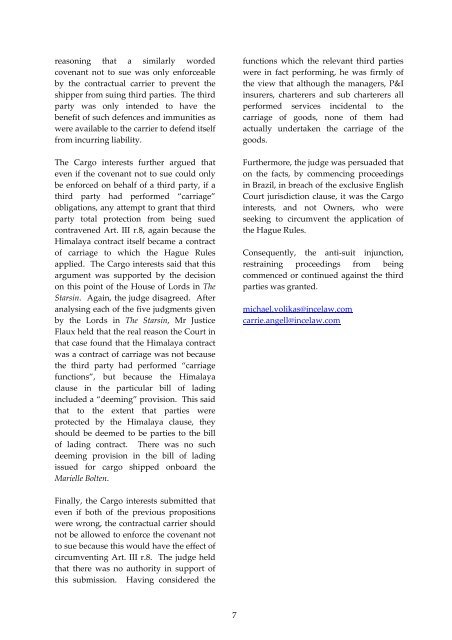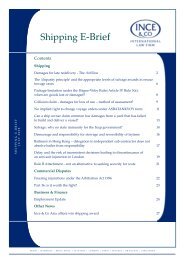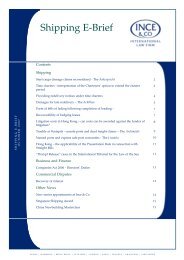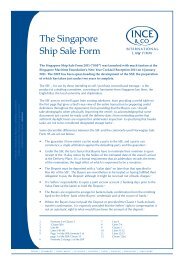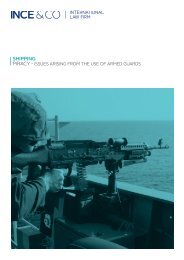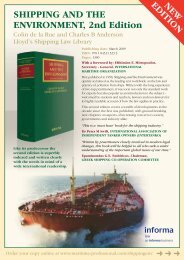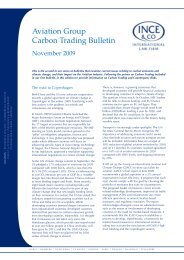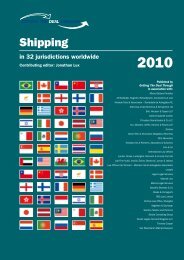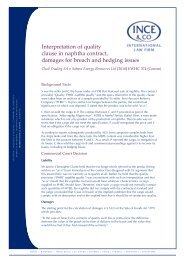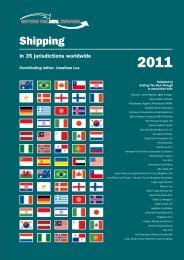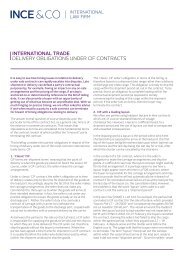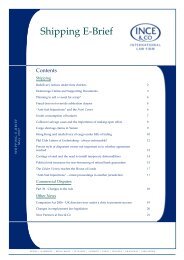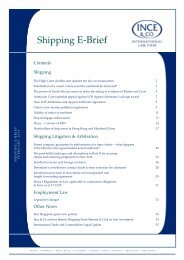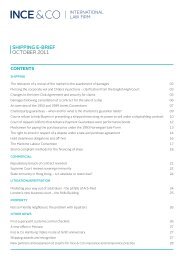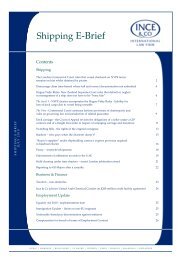Ince & Co Chinese Shipping E-brief August 2010 English Version
Ince & Co Chinese Shipping E-brief August 2010 English Version
Ince & Co Chinese Shipping E-brief August 2010 English Version
Create successful ePaper yourself
Turn your PDF publications into a flip-book with our unique Google optimized e-Paper software.
easoning that a similarly wordedcovenant not to sue was only enforceableby the contractual carrier to prevent theshipper from suing third parties. The thirdparty was only intended to have thebenefit of such defences and immunities aswere available to the carrier to defend itselffrom incurring liability.The Cargo interests further argued thateven if the covenant not to sue could onlybe enforced on behalf of a third party, if athird party had performed “carriage”obligations, any attempt to grant that thirdparty total protection from being suedcontravened Art. III r.8, again because theHimalaya contract itself became a contractof carriage to which the Hague Rulesapplied. The Cargo interests said that thisargument was supported by the decisionon this point of the House of Lords in TheStarsin. Again, the judge disagreed. Afteranalysing each of the five judgments givenby the Lords in The Starsin, Mr JusticeFlaux held that the real reason the <strong>Co</strong>urt inthat case found that the Himalaya contractwas a contract of carriage was not becausethe third party had performed “carriagefunctions”, but because the Himalayaclause in the particular bill of ladingincluded a “deeming” provision. This saidthat to the extent that parties wereprotected by the Himalaya clause, theyshould be deemed to be parties to the billof lading contract. There was no suchdeeming provision in the bill of ladingissued for cargo shipped onboard theMarielle Bolten.functions which the relevant third partieswere in fact performing, he was firmly ofthe view that although the managers, P&Iinsurers, charterers and sub charterers allperformed services incidental to thecarriage of goods, none of them hadactually undertaken the carriage of thegoods.Furthermore, the judge was persuaded thaton the facts, by commencing proceedingsin Brazil, in breach of the exclusive <strong>English</strong><strong>Co</strong>urt jurisdiction clause, it was the Cargointerests, and not Owners, who wereseeking to circumvent the application ofthe Hague Rules.<strong>Co</strong>nsequently, the anti‐suit injunction,restraining proceedings from beingcommenced or continued against the thirdparties was granted.michael.volikas@incelaw.comcarrie.angell@incelaw.comFinally, the Cargo interests submitted thateven if both of the previous propositionswere wrong, the contractual carrier shouldnot be allowed to enforce the covenant notto sue because this would have the effect ofcircumventing Art. III r.8. The judge heldthat there was no authority in support ofthis submission. Having considered the7


